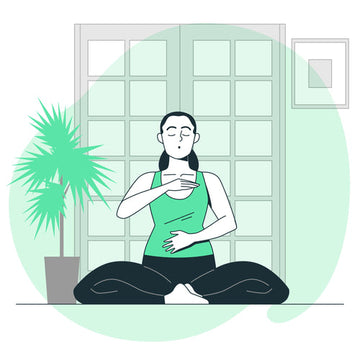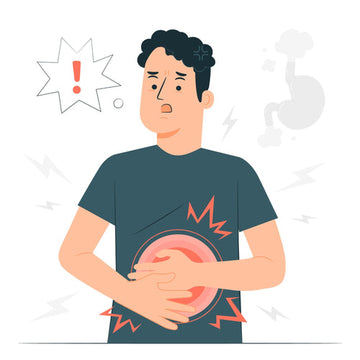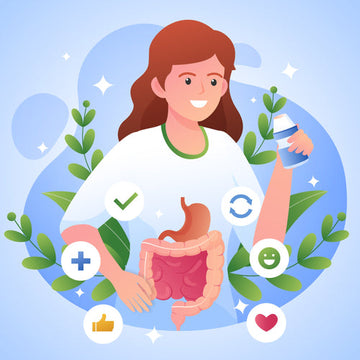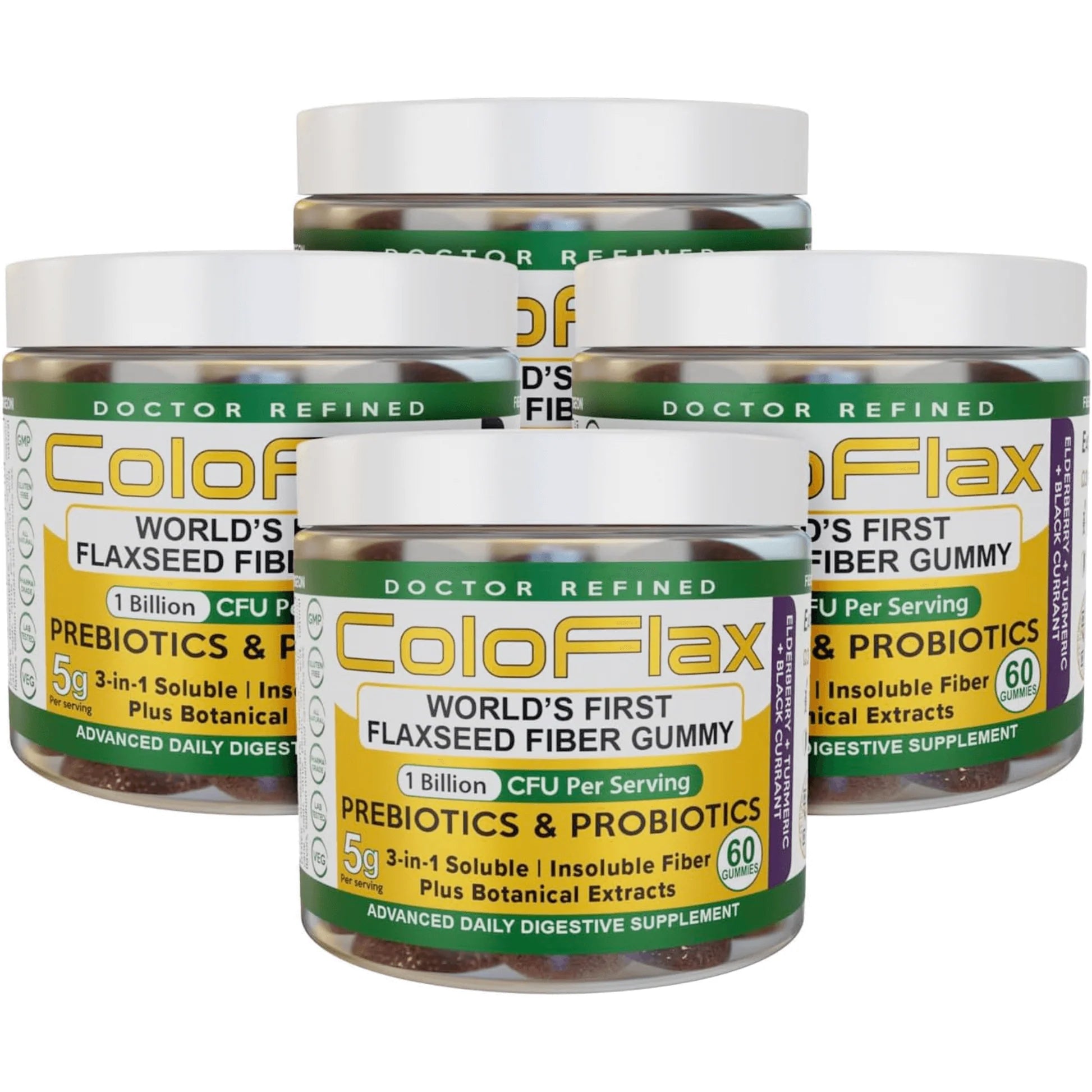Struggling with irregular bowel movements, abdominal discomfort, flatulence, and other complaints? We’ve all been there. It’s a drag. If your digestive health is struggling, it can impact other areas of your life, making you lethargic and irritable and even affecting your memory and mood.
But turning things around is easier than you might think. Check out the following guide to discover how you can drastically improve your digestive health in just 1 week!
Increase Your Fiber Intake
The Western world has a terrible relationship with fiber. As noted in previous guides on the subject of fiber consumption, only 5% of Americans eat enough. Yet, a lack of fiber is known to increase the risk of many conditions that kill hundreds of thousands of Americans every year.
That doesn’t mean that eating fiber will completely protect you from these conditions, but it could decrease your risk while supporting your overall health and well-being. It’ll also make your bowel movements more comfortable, which in turn could give you more energy and provide many indirect benefits.
It’s often dismissed as a laxative, something that you need more of if you’re constipated and should avoid at any other time. But a high-fiber diet is beneficial at all times.
There are two types of fiber: soluble and insoluble. The former is so named because it dissolves in water. It creates a gelatinous bulk in the gut, absorbs water, and expands. As this bulk moves through the gut, it pushes stools out. It also moves slowly and can therefore be beneficial if you have loose stools.
Insoluble fiber works by adding more bulk to the stool and helping food to pass through the digestive tract.
Ideally, you should consume both types of fiber, and they should be eaten as part of a healthy, balanced diet, one that contains a lot of whole foods and minimal processed food.
Drink More Water
If you’re eating a lot of fiber, you need to drink plenty of water so that the bulk can pass easily through your digestive tract. You may have heard that you need to drink 8 glasses of water per day, but the actual amount that you need differs from person to person and depends on everything from your age and physiology to your location and level of activity.
If you live in a cold climate and spend all of the day sitting at a desk or lounging on the couch, you’re going to need much less water than someone who lives in a desert climate and has a physically demanding job.
Drink when you’re thirsty. Drink when you eat. Drink when you’re hot, and take a bottle of water with you if you’re exercising or heading out into the sunshine.
Eating a whole-food diet makes a big difference, as well. If you swap a diet of bread, meat, cheese, TV dinners, and fast food for one high in fresh fruit and vegetables, you’ll likely get most of the water you need.
Not a fan of water? Add a little fruit juice or some chopped fruits to the glass. Flavored water, cold brew tea, and even hot tea are also great for topping up your fluid intake. Just make sure you’re not relying on sugary drinks (fruit juices, smoothies, sugary tea and coffee).
Eat Fermented Foods
Fermented foods contain live bacteria that support your digestive microbiome, ensuring it’s equipped to deal with harmful pathogens and support overall health and wellbeing. These are natural probiotics found in fermented vegetables like sauerkraut and kimchi, as well as “living” foods like kefir and bio yogurt.
Not only are these foods a great source of probiotics, but they are also usually low in fat and rich in other nutrients. Sauerkraut, for instance, is high in vitamin C and vitamin K while kefir and natural yogurt are high in calcium and protein.
Fermented foods are especially important if you typically subsist on a processed food diet or have recently taken antibiotics, both of which can harm the healthy bacteria in your gut.
Get Moving!
The goal of exercise isn’t just to shed a few pounds and improve your cardiovascular health. It can also improve your mental and digestive health.
Your digestive system is pretty adept and can do its job regardless of whether you’re sitting on the couch or spending an hour in the gym, but if you spend too long on that couch, it’ll get lazy, your digestion will slow down, and you’ll be more prone to constipation.
So, get off the couch, leave the office chair behind, and move around more.
You don’t need to go for a morning jog and then hit the gym in the afternoon. In fact, if you live a very sedentary lifestyle, it’s best to start small. Walk to work. Do some stretches. Practice Pilates or yoga. Even taking the dog for a long walk can make a big difference. By starting small, you’re less likely to injure yourself or set difficult and unmanageable goals that you’ll eventually give up on.
Consume Omega-3 Fatty Acids
Omega-3 fatty acids, as found in oily fish, flaxseeds, and chia seeds, could provide an array of benefits and may support digestive health. You’ll find a dose of omega-3 in our ColoFlax supplement, but you should also try to consume a few servings a week from whole foods.
Ideally, you want to stick with foods that give you a 4:1 ratio of omega 6 to omega 3 (4x more omega 6 than omega 3). Omega 6 can be beneficial in the right doses, but studies suggest that high quantities can have adverse health effects. It’s commonly found in soybeans, sunflower and safflower oils, nuts, seeds, and corn—most of which are abundant in the American diet.
But if that all sounds like too much of a headache, just focus on getting your oily fish/flaxseeds and eating healthily. The rest will happen naturally.
Relax and De-Stress
Have you ever felt “butterflies” in your stomach when you’re feeling nervous? Maybe you’ve struggled with bouts of diarrhea before a big event, exam, meeting, or interview. Needless to say, the gut can be impacted by the mind, and if you’re constantly anxious, stressed, and worried, you may struggle to maintain optimal digestive health.
Stress also increases your risk of a number of chronic conditions, so it’s important to promote calmness and balance in your daily life.
Obviously, that’s easier said than done. If you have a high-stress job, you can’t just tell your colleagues/bosses/clients to leave you alone, and if you quit, the financial implications will leave you even more stressed and anxious.
There are a few things that can help:
- Diet: Reducing your intake of caffeine and alcohol could help to restore some balance, leaving you less prone to heightened emotions.
- Practice Breathing Exercises: Whenever you feel stressed, take some time out, breathe deeply and slowly, and wait for the moment to pass. It may help to imagine you’re inhaling light and goodness and exhaling stress and anxiety.
- Take Long Soaks: Swap your rushed morning showers for long soaks in the bath on a nighttime.
- Swap Your Phone for a Book: Instead of spending your nights staring at your phone, pick up a book instead. Reading is relaxing and you won’t be distracted by constant notifications.
- Try Natural Remedies: There are some herbal remedies that could help to reduce your stress and anxiety. These include lavender, chamomile, valerian, and lemon balm. If you’re pregnant/breastfeeding, taking medication, or have an existing health condition, speak with your healthcare provider before taking any herbal medications.
- Get a Hobby: Whether you’re scrapbooking, making candles, learning to play an instrument, or doing a spot of gardening, it helps to have a hobby. It’ll focus your mind and give you a purpose that doesn’t revolve around your work, schoolwork, family, and the other things that make you stressed.
- Laugh More: Last but not least, let yourself go and laugh a little! Watch comedies, meet up with friends, and don’t be afraid to let out a few belly laughs. It can make a massive difference.
Check Your Medications
As noted above, herbal remedies can be an effective way to reduce stress and indirectly help your digestive health. But some meds can have the opposite effect, and in certain doses, these medications could negate the effects of many diet and lifestyle changes.
Such is the case with opioid pain medication. The anti-diarrheal drug Loperamide, sold under the brand name Imodium, is an opioid. Codeine has also been used for the treatment of chronic diarrhea in the past, showing you just how effective these drugs are at creating a digestive gridlock.
If you take them every day, you may have also been prescribed laxatives to deal with the inevitable constipation, and this can create an inescapable cycle.
Speak with your doctor if you take opioids and are struggling with your digestive health. They may be able to provide a gentle laxative or adjust the dose.
Opioids aren’t the only drugs that can create digestive issues. Many antidepressants and muscle relaxants are known to cause diarrhea while benzodiazepines, sedatives, and even some antacids can cause constipation.
Take a Fiber Supplement
Can’t get the fiber or probiotics you need from food? Consider a fiber supplement instead. It should never be used to replace a healthy and balanced diet, and taking a once-a-day fiber supplement won’t magically undo the effects of a terrible diet. But it can increase your intake of soluble/insoluble fiber and probiotics.
Look for a supplement that ticks all boxes. ColoFlax, for instance, is a tasty fiber gummy that contains both insoluble and soluble fiber, along with antioxidants, probiotics, prebiotics, and omega-3 fatty acids. It’s a one-serving-a-day gummy that’s convenient, tasty, and can support your digestive health.
Other supplements to consider include psyllium husk, which is a soluble fiber that can add bulk to your stools when taken with a lot of water; inulin, which is a prebiotic fiber often added to baked goods, and probiotics, which increase the number of bacteria in the gut.
Summary: A Week to Improve Your Digestive Health!
Maintaining a healthy digestive system takes time. You may need to make a lot of changes and if you’re used to doing things differently, it’ll take a lot of work. But it’s worth it. A healthy digestive tract can help you to maintain a healthy heart, mind, and body—you also won’t need to worry about your bowel movements.
So, make the changes outlined above, pay attention to your gut, and within a week, you should notice some massive improvements!






